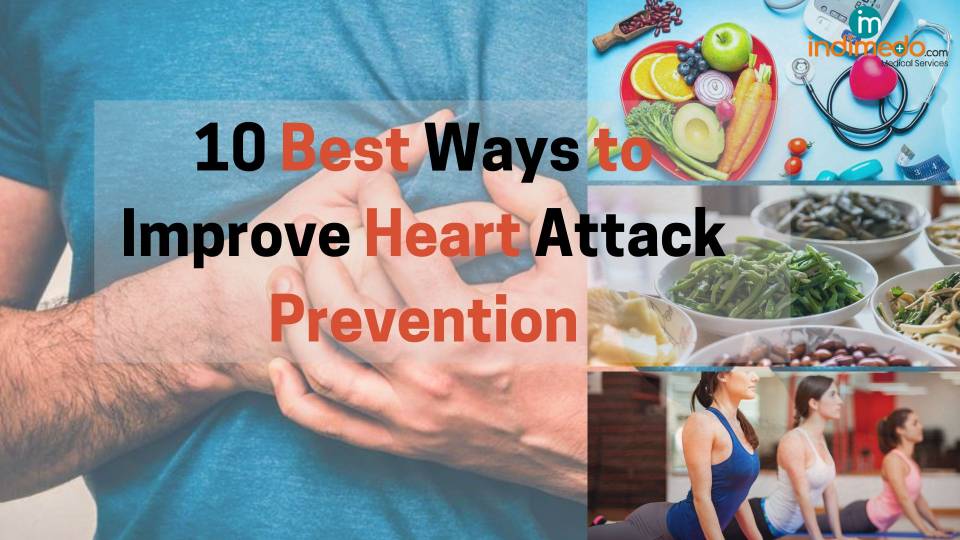Title: 10 Best Ways to Improve Heart Attack Prevention

Introduction
Heart attack, also known as myocardial infarction, is a serious and life-threatening medical condition that occurs when the blood flow to the heart is blocked or reduced, causing damage to the heart muscle. According to the World Health Organization (WHO), cardiovascular diseases, including heart attacks, are the leading cause of death globally, accounting for approximately 17.9 million deaths per year.
Fortunately, there are several steps that individuals can take to reduce their risk of heart attack and promote overall heart health and Heart Attack Prevention. In this article, we will provide some top tips for heart attack prevention, including lifestyle changes, dietary recommendations, and medical interventions. By implementing these tips, individuals can take proactive steps to protect their heart health and reduce their risk of a heart attack.
Heart Attack Prevention
Heart attacks, also known as myocardial infarctions, can be prevented by making lifestyle changes that reduce your risk factors. Here are some tips to help prevent a heart attack:
Quit smoking: Smoking is a major risk factor for heart attacks. If you smoke, quit as soon as possible.
Exercise regularly: Regular physical activity can help reduce your risk of a heart attack. Aim for at least 150 minutes of moderate-intensity exercise per week.
Maintain a healthy weight: Being overweight or obese increases your risk of heart disease. Adopt a healthy diet and exercise regularly to maintain a healthy weight.
Eat a healthy diet: Include plenty of fruits, vegetables, whole grains, lean protein, and healthy fats in your diet. Avoid processed foods, sugary drinks, and foods high in saturated and trans fats.
Manage stress: Chronic stress can contribute to heart disease. Find healthy ways to manage stress, such as exercise, meditation, or yoga.
Control high blood pressure: High blood pressure is a major risk factor for heart disease. Monitor your blood pressure regularly and take steps to keep it under control, such as following a healthy diet and exercising regularly.
Control high cholesterol: High levels of LDL (bad) cholesterol can contribute to the buildup of plaque in your arteries, increasing your risk of heart disease. Eat a heart-healthy diet and take medication if prescribed by your doctor.
Limit alcohol consumption: Drinking too much alcohol can increase your blood pressure and contribute to other heart disease risk factors. If you drink alcohol, limit your consumption to one drink per day for women and two drinks per day for men.
By following these tips, you can reduce your risk of heart attack and maintain a healthy heart.
Heart Healthy Diet Plan
A Heart Healthy Diet Plan focuses on consuming foods that are low in saturated and trans fats, added sugars, and sodium, and high in fiber, vitamins, minerals, and antioxidants. Here is a sampleHeart Healthy Diet Plan:
Breakfast
- Oatmeal with low-fat milk or unsweetened almond milk, topped with fresh berries and chopped nuts
- Whole-grain toast with avocado and tomato slices
- Low-fat Greek yogurt with sliced banana and a sprinkle of cinnamon
Mid-morning snack
- Apple slices with almond butter
- Baby carrots with hummus
- Whole-grain crackers with low-fat cheese
Lunch
- Grilled chicken or fish with a side of mixed greens, topped with vegetables and a light vinaigrette dressing
- Lentil soup with a side of whole-grain bread
- Quinoa salad with mixed vegetables and a light citrus dressing
Mid-afternoon snack
- Fresh fruit, such as berries or a pear
- Low-fat cottage cheese with sliced cucumbers
- Air-popped popcorn
Dinner
- Grilled salmon or tofu with roasted vegetables and quinoa
- Chicken stir-fry with brown rice and mixed vegetables
- Lentil and vegetable curry with a side of whole-grain naan bread
Dessert
- Fresh fruit salad
- Dark chocolate with a sprinkle of sea salt
- Homemade fruit sorbet
In addition to following a Heart Healthy Diet Plan, it is important to stay physically active and maintain a healthy weight. It is also recommended to limit alcohol consumption and avoid smoking. Consult with a healthcare professional for personalized recommendations.
Heart Health Supplements
There are a variety of Heart Health Supplements that have been suggested to support heart health. However, it is important to note that while some Heart Health Supplements may have potential benefits, they should not be used as a replacement for a healthy diet and lifestyle. Here are some Heart Health Supplements that have been studied for their potential effects on heart health:
Omega-3 fatty acids: These are found in fish oil supplements and are thought to support heart health by reducing inflammation and lowering triglyceride levels.
Coenzyme Q10 (CoQ10): This is an antioxidant that is naturally produced in the body and is involved in energy production. It has been suggested to support heart health by improving heart function and reducing the risk of heart failure.
Magnesium: This mineral is involved in over 300 biochemical reactions in the body, including those that regulate heart function. Some studies have suggested that magnesium supplementation may help to reduce blood pressure and improve heart health.
Garlic: This herb has been used for centuries for its potential health benefits, including supporting heart health. Some studies have suggested that garlic may help to reduce blood pressure and lower cholesterol levels.
Vitamin D: This vitamin is important for bone health, but it may also play a role in heart health. Some studies have suggested that vitamin D supplementation may help to reduce the risk of heart disease and stroke.
It is important to speak with a healthcare provider before starting any new supplement regimen, as Heart Health Supplements can interact with medications and may not be appropriate for everyone.
Vitamins For Heart Health
There are several vitamins that can be beneficial Vitamins For Heart Health, including:
Vitamin D: Research suggests that vitamin D can help regulate blood pressure, reduce inflammation, and improve endothelial function, which is the ability of blood vessels to relax and contract.
Vitamin B complex: Vitamins B6, B12, and folic acid (B9) can help reduce levels of homocysteine, an amino acid that can damage the lining of blood vessels and increase the risk of heart disease.
Vitamin C: This antioxidant can help reduce inflammation and prevent the oxidation of cholesterol, which can lead to plaque buildup in the arteries.
Vitamin E: Like vitamin C, vitamin E is an antioxidant that can help prevent the oxidation of cholesterol and reduce inflammation.
Coenzyme Q10: This compound plays a key role in energy production and may help improve heart function in people with heart failure.
It's important to note that while Vitamins are For Heart Health, they should not be used as a substitute for a healthy diet and lifestyle. Eating a balanced diet rich in fruits, vegetables, whole grains, lean protein, and healthy fats, and engaging in regular physical activity are the most important ways to maintain a healthy heart.
Heart Healthy Drinks
There are many Heart Healthy Drinks that you can incorporate into your diet to help maintain a healthy heart. Here are some options:
Water: Staying hydrated is crucial for overall health, including heart health. Drinking enough water can help lower blood pressure and prevent dehydration, which can put added stress on the heart.
Green tea: Green tea is packed with antioxidants called catechins that can help protect against heart disease. Studies have also found that drinking green tea may help lower blood pressure and cholesterol levels.
Beetroot juice: Beetroot juice is high in nitrates, which can help lower blood pressure and improve blood flow. Studies have also found that drinking beetroot juice can help improve exercise performance and reduce inflammation in the body.
Cranberry juice: Cranberry juice is rich in antioxidants and can help reduce inflammation in the body. Studies have also found that drinking cranberry juice may help lower cholesterol levels and improve blood pressure for Heart Healthy Drinks.
Pomegranate juice: Pomegranate juice is rich in antioxidants called polyphenols that can help protect against heart disease. Studies have also found that Heart Healthy Drinks pomegranate juice may help improve blood flow and reduce inflammation in the body.
Tomato juice: Tomato juice is rich in lycopene, a powerful antioxidant that can help protect against heart disease. Studies have also found that drinking tomato juice can help lower blood pressure and cholesterol levels.
Low-fat milk: Low-fat milk is a good source of calcium and vitamin D, which can help maintain healthy bones and a healthy heart. Studies have also found that drinking low-fat milk may help lower blood pressure.
Remember, the best way to keep your heart healthy is to maintain a healthy diet and lifestyle overall. It is also important to speak with your healthcare provider to determine what is best for your individual needs.
Conclusion
In conclusion, preventing heart attacks is crucial for maintaining a healthy life. There are several effective ways to reduce the risk of heart attacks. The ten best ways to improve heart attack prevention are Quitting smoking, Maintaining a healthy diet, Exercising regularly, Managing stress, Getting enough sleep, Controlling blood pressure, Managing diabetes, Maintaining a healthy weight, Limiting alcohol intake, Regularly monitoring cholesterol levels.
By incorporating these lifestyle changes into your daily routine, you can greatly reduce your risk of having a heart attack. It is also important to consult with your doctor regularly to assess your risk and discuss any necessary preventative measures or medications. With a proactive approach, you can maintain a healthy heart and live a long and fulfilling life.





 Login with Facebook
Login with Facebook
 Login with Google
Login with Google